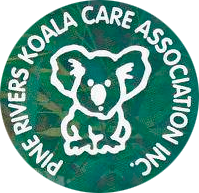Koala Fact Sheet
Order: Marsupial Mammal.
Genus & Species: Phascolarctus cinereus (ash-grey pouched bear).
Common Name: Koala. An Aboriginal name meaning "no water".
Weight: 6kg to 9kg (koalas in southern states are heavier).
Eyes: Brown.
Fur Colour: Silver grey and cream.
Lifespan: 15 to 18 Years in captivity - Unknown in wild.
Sexual Maturity: Male 3 to 4 Years, Female 2 Years.
Gestation: 30 to 35 Days, mates at night in the treetops.
Young: Newborn is the size of a Broad Bean (2cm and referred to as a "Pinkie"), blind and hairless. At birth the young forces its way through its mother's fur to reach her pouch and attach itself to one of two teats. At 6 months it leaves the pouch and moves to the mother's back or chest (referred to as a "Backrider"). At 12 months the baby usually becomes independent.
Number of Young: One - rare instances of twins.
Pouch: Backward facing (prevents bark and leaves from entering the pouch - similar to the Wombat).
Habitat: Solitary tree dweller (non-social animal).
Diet: Eucalyptus leaves. Adult eats about 500g each day.
Digestion: Eucalyptus leaves are low in nutrition and contains 20% in fibre, with tannins more than 10%, water 50% and minerals 2%. Koalas have developed a special intestinal chamber called the caecum, which contains bacteria, which ferments the leaves to make them more digestible.
Food Trees: Feeds on about 12 of the couple of hundred eucalyptus species that grow in Australia.
Hydration: Eucalyptus leaves, only drinks in severe drought or sick
Call: Harsh call like a female screaming or guttural like a wild pig.
Distribution: Dense populations in coastal regions with sparse populations in outback Queensland, New South Wales, Victoria and Parts of South Australia
Conservation: Protected species, classification "common", although classified as "regionally vulnerable" in S E Queensland. Pine Rivers identified as having "the healthiest urban population in Australia."
Threats: Habitat destruction, disease, domestic dogs and vehicles (in the wild from dingos, eagles and feral domestic animals



